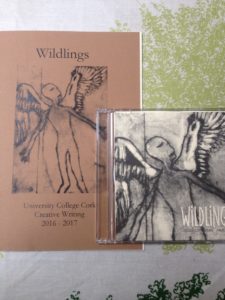MA student Jacqui Corcoran, with a background in broadcasting, describes how she and fellow student, book-binder Paul Asta, set about marrying craft and enterprise to produce a thing of beauty with their Wildlings project.
Rilke’s advice to “ask yourself in the most silent hour of night: must I write?” is wise counsel, mirrored in a recent talk at UCC from visiting writer Lionel Shriver. Shriver, a high-profile, prolific writer who has had much commercial success, was forthright about the very real struggle it is to make a living out of any creative practice.
Perhaps one of the biggest questions we might ask ourselves as creative writing students, is not the more obvious do we have the talent, but the more practical question – are we ready or able to fully commit to a career and life that will demand so much and (if we’re even lucky enough to get published) will probably give little or no financial reward in return?
The Business of Writing module on UCC’s MA in Creative Writing attempts to offer students a springboard to explore ways to earn a crust in the arts. The module features a series of lectures featuring writers, agents and publishers coupled with a one-week work experience placement. For our work experience this semester, fellow student, poet and book-binder Paul Asta and I decided to set up our own enterprise.
I use the term “enterprise” loosely. The word is usually taken to imply some sort of task being tackled in the hopes of reaping financial reward. For our project, Wildings, we invited our fellow creative writing students to submit poetry, fiction and memoir samples. We collected these into a chapbook and made audio recordings of the writers’ work. The project was never about making money. With contributions from participants, we went some way towards covering our costs, but this project was about something else entirely.
So what was it about? At the informal launch of Wildlings last week, one of our fellow students put it perfectly when she described the CD and chapbook as “beautiful things to hold.” She was right. The final “product” was very nice. But, for me, it was also about the process.
There was something very satisfying in watching the transition of writers’ words to the page and on to the CD. It was about marrying of different elements of our work and being able to present a memento to our classmates and tutors of our time together, a token of sorts. It was about finding a way to gather samples of our writings and say – this is what we did, here is the evidence of our various journeys.
It was about holding some moment, capturing, or at least attempting to capture, some essence of our learning experience. It was about the understated, home-crafted pieces that evolved out of Paul’s hours of typesetting, printing and hand-stitching the booklets. It was about designing covers using a simple print of mine that had some personal resonance around taking steps towards a writing life. It was about mastering the challenges of new software and failing old technology! It was about hearing confidence and change in people’s voices as their individual creative journeys evolved on and off the page, on air and when the microphone was switched off.
In a recent Guardian podcast, outgoing chair of Arts Council UK, Peter Bazalgette, was asked why public money should be put into the arts. He spoke of the obvious social and economic benefits, but also the intrinsic benefit of the arts as a way of telling human stories that help you put yourself in somebody else’s shoes.
Mentioning myself and Paul’s project in the context of far more worthy and worldly discussions on the arts might seem a lofty parallel, but being creative and actually creating doesn’t always have to be about the making of monumental work that will change the world.
Wildlings won’t be making any waves other than the ripples caused in a few raised glasses at The Abbey Tavern last Friday. But all the hard work has paid off in the shape of these beautiful things to hold. That is the reward.

